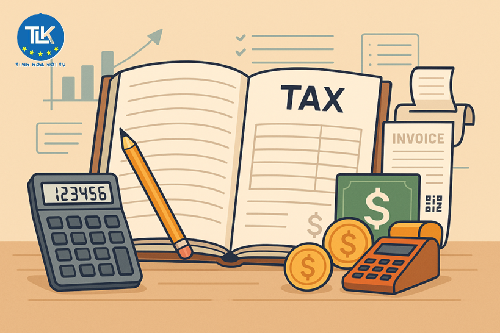Decree No. 70/2025/NĐ-CP stipulates that business households with annual revenue of VND 1 billion or more must issue electronic invoices (e-invoices) generated from cash registers connected to the tax authority’s data system. Business households that are required to use such e-invoices but fail to comply may be subject to penalties of up to VND 20 million.
=> See more: 10 circumstances for suspension of e-invoice sage effective from June 1, 2025
Photo 1. Penalties for Business Households Failing to Use E-Invoices Generated from Cash Registers under Decree No. 70/2025/NĐ-CP_ Hotline: 097 211 8764
Specifically, under Clause 4, Article 24 of Decree No. 125/2020/NĐ-CP, as amended by Clause 3, Article 1 of Decree No. 102/2021/NĐ-CP, the following violations are subject to a monetary fine ranging from VND 4,000,000 to VND 8,000,000:
1. Issuing invoices not at the legally prescribed time in accordance with regulations on invoices for the sale of goods and provision of services, except in cases where the incorrect issuance time does not result in a delay in fulfilling tax obligations or does not give rise to a tax obligation, and mitigating circumstances apply;
2. Issuing invoices not in sequential order from the lowest to highest number as prescribed, except for cases subject to a warning, where invoices are issued continuously in ascending order but from a different invoice book (i.e. using a book with a higher serial number while a book with a lower serial number remains unused), and the organization or individual, upon discovery, has cancelled the unused invoice books with lower serial numbers;
3. Issuing invoices dated prior to the date of purchasing invoice forms from the tax authority;
4. Issuing the wrong type of invoice in violation of regulations on invoices for the sale of goods and provision of services, where the invoice has already been delivered to the buyer or declared for tax purposes, except in cases subject to a warning, where the seller and buyer detect the error, re-issue the correct type of invoice before the competent authority issues a decision on inspection or audit at the taxpayer’s premises, and such error does not affect the determination of tax obligations;
5. Issuing e-invoices without obtaining prior approval from the tax authority or before the effective date of approval for using e-invoices with or without a tax code issued by the tax authority;
6. Issuing invoices for the sale of goods or provision of services during the period of temporary business suspension, except where invoices are issued to customers for contracts signed before the notice of business suspension;
7. Issuing e-invoices generated from cash registers that are not connected to or transmitting data to the tax authority;
8. Issuing invoices without including all mandatory contents as prescribed by law
Furthermore, under Clause 5, Article 24 of Decree No. 125/2020/NĐ-CP, a monetary fine ranging from VND 10,000,000 to VND 20,000,000 shall apply to acts of failing to issue invoices upon selling goods or providing services to buyers as required, except for goods and services used for promotions, advertising, samples, gifts, donations, exchanges, or wages paid in kind, excluding internally circulated or consumed goods used in ongoing production.
Accordingly, household business owners who fail to issue e-invoices generated from cash registers connected to the tax authority’s data system may be subject to fines ranging from VND 10 million to VND 20 million, as this constitutes a failure to issue invoices as required by law under Clause 5, Article 24 of Decree No. 125/2020/NĐ-CP. In cases where business households issue e-invoices from cash registers not connected to the tax authority, they may be fined between VND 4 million and VND 8 million.
Notes: To avoid violations and ensure lawful business operations, business households should pay close attention to the following:
1. Mandatory use of e-invoices generated from cash registers that are connected to the tax authority’s data system;
2. Regularly monitor and ensure stable data transmission connections;
3. Stay updated on legal regulations regarding e-invoices;
4. Select and use compatible software and devices;
5. Properly store and maintain all records and supporting documents.
Compliance with e-invoice regulations not only helps business households avoid unnecessary penalties but also contributes to a transparent, fair, and efficient business environment.
=> See more: Regulations on the inspection of certificate of origin documents from April 29,2025

Photo 2: Free Legal Consultation_Hotline: 097 211 8764
Social and Economic General Department – TLK Law Firm
Dear readers, TLK Law Firm not only provides you with useful information about economic and socio-cultural life but also offers professional legal services, accounting, taxation, and trade promotion with many years of experience.
With a commitment to fulfilling our social responsibility, if you need advice on legal issues, please contact us at hotline: 097 211 8764 for direct consultation with our lawyers (completely free of charge).












